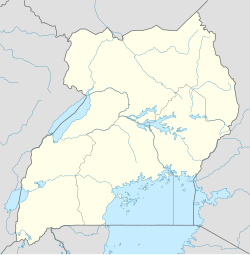Please tell us which country and city you'd like to see the weather in.
| Goli | |
|---|---|
|
|
|
| Coordinates: 02°23′12″N 31°01′48″E / 2.38667°N 31.03°E | |
| Country | |
| Regions of Uganda | Northern Region |
| Sub-region | West Nile sub-region |
| Districts of Uganda | Zombo District |
| Government | |
| • Mayor | |
| Elevation | 1,400 m (4,600 ft) |
| Time zone | EAT (UTC+3) |
Goli, Uganda, often referred to simply as Goli, is a town in Northern Uganda.
Contents |
Location [link]
Goli is located in Zombo District, West Nile sub-region in Northern Uganda. The town lies close to the border with the Democratic Republic of the Congo. It is located approximately 90 kilometres (56 mi), by road, southeast of Arua, the largest town in the sub-region.[1] This location lies approximately 360 kilometres (220 mi), by road, northwest of Kampala, the capital of Uganda and the largest city in that country.[2] The district headquarters, at Zombo, are located about 25 kilometres (16 mi), by road, northwest of Goli.[3] The coordinates of the town are:02 23 12N, 31 01 48E (Latitude:2.3867; Longitude:31.0300).
Overview [link]
The small town of Goli, Uganda sits on Uganda's border with the Democratic Republic of the Congo (DRC). It is located on the main road between Arua, the largest city in the West Nile sub-region on the Ugandan side and Bunia, the capital of Ituri Province in the DRC. In 2009, Goli was one of the locations of disagreements between Uganda and DRC over their international border. The two countries selected a review commission to study the problem and report to the two governments.[4]
Population [link]
The exact population of Goli, Uganda is not known as of January 2010.
Landmarks [link]
The landmarks within the town limits or close to the edges of town include:
- The offices of Goli Town Council
- The International Border Crossing into the Democratic Republic of the Congo
- World Concern Medical Center - A rural health facility run by a missionary nurse
- Goli Central Market
External links [link]
Photos [link]
See also [link]
References [link]
|
||||||||||||||||||||
https://wn.com/Goli,_Uganda

Goli
Goli is a village development committee in Solukhumbu District in the Sagarmatha Zone of north-eastern Nepal. At the time of the 1991 Nepal census it had a population of 2276 people living in 455 individual households.
References
External links
Goli (disambiguation)
Goli may refer to:
See also

Uganda
Coordinates: 1°N 32°E / 1°N 32°E
Uganda (/juːˈɡændə/ yew-GAN-də or /juːˈɡɑːndə/ yew-GAHN-də), officially the Republic of Uganda, is a landlocked country in East Africa. It is bordered to the east by Kenya, to the north by South Sudan, to the west by the Democratic Republic of the Congo, to the southwest by Rwanda, and to the south by Tanzania. Uganda is the world's second most populous landlocked country after Ethiopia. The southern part of the country includes a substantial portion of Lake Victoria, shared with Kenya and Tanzania, situating the country in the African Great Lakes region. Uganda also lies within the Nile basin, and has a varied but generally a modified equatorial climate.
Uganda takes its name from the Buganda kingdom, which encompasses a large portion of the south of the country, including the capital Kampala. The people of Uganda were hunter-gatherers until 1,700 to 2,300 years ago, when Bantu-speaking populations migrated to the southern parts of the country.

Uganda (Commonwealth realm)
Uganda, today the Republic of Uganda, was a Commonwealth realm between 1962 and 1963. When British rule ended in 1962, the Uganda Independence Act 1963 transformed the Uganda Protectorate into an independent country called Uganda that retained the British monarch, Elizabeth II, as head of state. The royal succession was governed by the English Act of Settlement of 1701.
The Queen's position vis-a-vis Uganda was entirely separate from her role in any other country. The Queen's title when she was head of state in independent Uganda was: Her Majesty Elizabeth the Second, by the Grace of God, Queen of Uganda and of Her other Realms and Territories, Head of the Commonwealth. Her constitutional roles were mostly delegated to the Governor-General of Uganda. The following Governors-General held office:
Milton Obote held office as prime minister (and head of government) of Uganda during this period.
Uganda adopted a new constitution in 1963 which abolished the monarchy. Uganda became a republic within the Commonwealth. However, the new Ugandan state was deliberately not referred to as a republic, and the constituent native kingdoms (such as Buganda) continued in existence. Following the abolition of the monarchy by the proclamation of the State of Uganda on 9 October 1963, the Kabaka (King) of Uganda, Edward Mutesa II, became the first President of Uganda. The description "State" implied that the post-Commonwealth realm was not a republic but instead a "federation of tribal kingdoms". Uganda did not become a republic de jure until 1966 with Obote's conflict with President Edward Mutesa II.
Radio Stations - Gori
Podcasts:
Göli
ALBUMS
- Minnesänger & Meistersinger released: 1988
Goli
ALBUMS
- Pure Dubstep released: 2010
- Together We Fall Apart released:
- Goli released:


